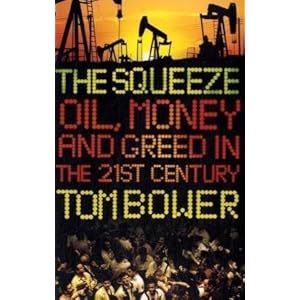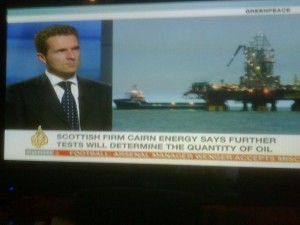Oil prices are going up, the economy is slowing down and Andrew Sentance says interest rates should go up – deja vu anyone?
I don’t share the pessimism of many about the revolts in Tunisia, Egypt and Libya. So what if it is somewhat directionless and entirely unanticipated – that part of the world has tried foreign rule, autocracy, military and religous dictatorships and found them all wanting. Virtually none of these protesters are crying out for a return to or enhancement of any of those systems.
It’s not a fashionable view, but I’m increasingly convinced that Francis Fukuyama will be proven correct that the end of history – i.e. that all paths will eventually lead to the least bad system – liberal democracy – because everything else is deemed to have failed. It is a question of time, albeit a long one.
Having said that, I certainly don’t share the optimism which seems a little too prevalent on oil prices and here’s why;
Optimist argument No. 1 – Libya is only 1.7% of world output and Saudi Arabia can easily close the gap.
Wrong for the following reasons.
The cut of crude that comes out from Saudi is high sulphur and harder to refine. Refineries are built to refine a certain type of crude and they can’t easily switch over.
Although oil is a globally fungible commodity, this has a highly regional impact because most of Libya’s exported crude went to Italy, Germany and Spain.
Even if Saudi cranks up production the oil will still have to be extracted, refined and transported. That takes time and would require a change of existing agreements.
Optimist argument no. 2. The IEA will release up to 1.6 billion barrels of spare inventory which will keep prices down.
Wrong again. If you reduce the cushion for supply disruptions by lowering reserves the market will price in higher risk and higher prices. The real question is who can lift supply and immediately? Answer – no one really.
Optimist argument no. 3. OPEC are sensible enough not to drive the world economy into recession and will quickly agree to lift production.
Even more wrong. OPEC have a terrible record of controlling prices – they can’t – and they are not slated to meet to discuss new quotas until June 2nd 2010 in Vienna. And that’s assuming that they would agree in the first place about what an acceptable price is and not cheat on their quotas.
This unrest also has long-term implications for the investment risk models of the sorts of long-term fixed capital projects needed to meet future oil demand. Typically it’s a 10 year gap between oil discovery and bringing it to market. I wonder how much money is going to be written off in Libya?
Of course, this is a one-sided post meant to take issue with received opinion.
I’ll be balancing it with a grounds for optimism angle later in the week.




 is worried about the impact of oil prices
is worried about the impact of oil prices


